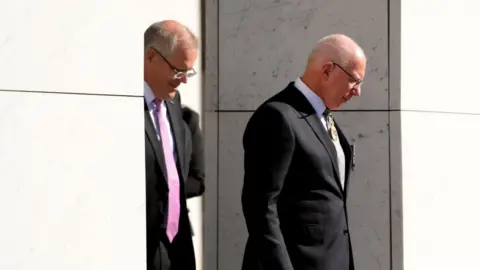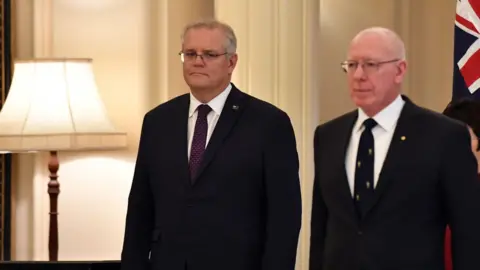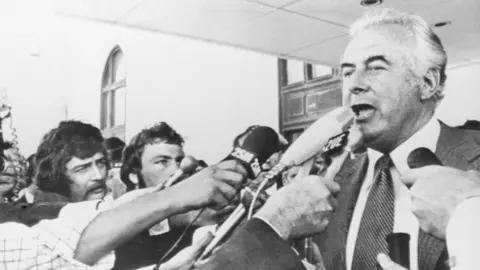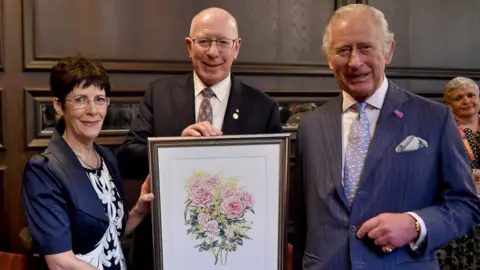Australia: Scott Morrison saga casts scrutiny on Queen's representative
 Getty Images
Getty ImagesIn the past fortnight, Australia has been gripped by revelations that former Australian Prime Minister Scott Morrison secretly appointed himself to several additional ministries.
The move has been labelled a "power grab" by his successor as prime minister, and Mr Morrison has been scolded by many - even his own colleagues.
But the scandal has also dragged Australia's governor-general into the fray - sparking one of the biggest controversies involving the Queen's representative in Australia in 50 years.
So does Governor-General David Hurley have questions to answer, or is he just collateral damage?
'Just paperwork'
Governors-general have fulfilled the practical duties as Australia's head of state since the country's 1901 federation.
Candidates for the role were initially chosen by the monarch but are now recommended by the Australian government.
The job is largely ceremonial - a governor-general in almost every circumstance must act on the advice of the government of the day. But conventions allow them the right to "encourage" and "warn" politicians.
Key duties include signing bills into law, issuing writs for elections, and swearing in ministers.
Mr Hurley has run into trouble on the latter. At Mr Morrison's request, he swore the prime minister in as joint minister for health in March 2020, in case the existing minister became incapacitated by Covid.
 Getty Images
Getty ImagesOver the next 14 months, he also signed off Mr Morrison as an additional minister in the finance, treasury, home affairs and resources portfolios.
Mr Morrison already had ministerial powers, so Mr Hurley was basically just giving him authority over extra departments.
It's a request the governor-general "would not have any kind of power to override or reject", constitutional law professor Anne Twomey tells the BBC.
"This wasn't even a meeting between the prime minister and the governor-general, it was just paperwork."
But Mr Morrison's appointments were not publicly announced, disclosed to the parliament, or even communicated to most of the ministers he was job-sharing with.
Australia's solicitor-general found Mr Morrison's actions were not illegal but had "fundamentally undermined" responsible government.
But the governor-general had done the right thing, the solicitor-general said in his advice this week.
It would have been "a clear breach" for him to refuse the prime minister, regardless of whether he knew the appointments would be kept secret, Stephen Donaghue said.
Critics push for investigation
Ultimately, Mr Hurley had to sign off on Mr Morrison's requests, but critics say he could have counselled him against it and he could have publicised it himself.
But representatives for the governor-general say these types of appointments - giving ministers the right to administer other departments - are not unusual.
And it falls to the government of the day to decide if they should be announced to the public. They often opt not to.
Mr Hurley himself announcing the appointments would be unprecedented. He had "no reason to believe that appointments would not be communicated", his spokesperson said.
Emeritus professor Jenny Hocking finds the suggestion Mr Hurley didn't know the ministries had been kept secret "ridiculous".
"The last of these bizarre, duplicated ministry appointments… were made more than a year after the first, so clearly by then the governor-general did know that they weren't being made public," she says.
"I don't agree for a moment that the governor-general has a lot of things on his plate and might not have noticed."
The historian says it's one of the biggest controversies surrounding a governor-general since John Kerr caused a constitutional crisis by sacking Prime Minister Gough Whitlam in 1975.
 Getty Images
Getty ImagesProf Hocking famously fought for transparency around that matter - waging a lengthy and costly legal battle that culminated in the release of Mr Kerr's correspondence with the Queen.
And she says the same transparency is needed here.
The Australian public need to know whether Mr Hurley counselled the prime minister against the moves, and why he didn't disclose them himself.
The government has already announced an inquiry into Mr Morrison's actions, but she wants it to look at the governor-general and his office too.
"If the inquiry is to find out what happened in order to fix what happened, it would be extremely problematic to leave out a key part of that equation."
Former Prime Minister Malcolm Turnbull - Mr Morrison's predecessor - has also voiced support for an inquiry.
"Something has gone seriously wrong at Government House," he told the Australian Broadcasting Corporation.
"It is the passive compliance along the chain… that did undermine our constitution and our democracy… that troubles me the most. This is how tyranny gets under way."
PM defends governor-general
Prof Twomey says the criticism of Mr Hurley is unfair - there's was no "conspiracy" on his part to keep things secret.
"I don't think it's reasonable for anyone to expect that he could have guessed that the prime minister was keeping things secret from his own ministers, for example.
"Nobody really thought that was a possibility until about two weeks ago."
Even if he had taken the unprecedented step to publicise the appointments or to reject Mr Morrison's request, he'd have been criticised, she says.
"There'd be even more people saying 'how outrageous!'" she says. "The role of governor-general is awkward because people are going to attack you either way."
Prime Minister Anthony Albanese has also defended Mr Hurley, saying he was just doing his job.
"I have no intention of undertaking any criticism of [him]."
A role fit for purpose?
Prof Hocking says it's a timely moment to look at the role of the governor-general more broadly.
She points out it's possible the Queen may have been informed about Mr Morrison's extra ministries when Australia's parliament and people were not.
"It does raise questions about whether this is fit for purpose, as we have for decades been a fully independent nation, but we still have… 'the relics of colonialism' alive and well."
 Getty Images
Getty ImagesMomentum for a fresh referendum on an Australian republic has been growing and advocates have seized on the controversy.
"The idea that the Queen and her representative can be relied upon to uphold our system of government has been debunked once and for all," the Australian Republic Movement's Sandy Biar says.
"It's time we had an Australian head of state, chosen by Australians and accountable to them to safeguard and uphold Australia's constitution."
But Prof Twomey says republicans are "clutching at straws" - under their proposals, the head of state would also have been bound to follow the prime minister's advice.
"It wouldn't result in any changes that would have made one iota of difference."
